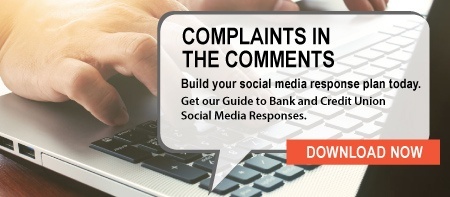
Complaints and negative comments are a perpetual reality online. No matter how large or small, every bank or credit union will receive negative feedback online. Some institutions will delay or avoid engaging with the public on social media for fear of opening a Pandora's box of complaints. Others feel intimidated by the human power required to manage multiple social accounts, respond to direct messages, and tweeted questions that could be easily answered by searching your website. We're here to tell you it's not only doable, but that social media complaints are an opportunity for your institution to develop its brand, increase customer loyalty, and win new customers—if you follow these best practices.
Share of Voice
Avoidance is not a viable option. If you do not have a controlled social presence, people will go online and complain about you anyway. By seizing control of your social presence, you bring those complaints into your arena, seizing control of the conversation.
By increasing your social media presence, you will increase your share of voice. When people are complaining about your institution, you can step in and intervene before it escalates. If something negative happens in one of your branches and it ends up on the evening news, you can be there to tell your side of the story.
Complaints are Opportunities
Rather than viewing complaints as a liability, see complaints as insight into possible improvements. Social media feedback, be it positive or negative, is an instant litmus test for your institution's customer service, mortgage application process, and mobile banking app. A successful social media response strategy hinges on making lemonade out of lemons: using every complaint as an opportunity to showcase customer service, adjust processes and products, and improve user experience. Brands that honestly embrace and engage with complaints on social media earn respect and trust from customers, followers, and the general public. It's a cookie with icing on both sides, because while this good behavior earns you brownie points, fully utilizing the feedback means improved UX (user experience) and products.
Best Practices for Social Media Responses
- Respond quickly. Pop quiz, what was the hot news story last Tuesday? With the 24/7 news cycle and our instant gratification culture, waiting a day or two to respond to a complaint is the equivalent of ignoring it altogether, which is like telling your customer that you don't care about their experience or their business.
- Use empathetic language. Let's step back into basic communication skills. De-escalation is all about letting someone know that you heard them, that you're sorry, and that you care.
- Take responsibility for real errors. The public now expects brands to interact with them like people: that means you need to have a personality, seem approachable, and show that you can be the bigger person. HubSpot rounded up some of the most notable recent brand apologies to give you an idea of what resonates with the public.
- Educate. Resist the urge to roll your eyes when someone comments on your Facebook page to ask how to download your mobile app. Sure, the info might be spelled out on your website, and sure you could just send them a link. But remember, other people might be watching and some of them might have that same question. Put on your teacher hat, repeat there is no such thing as a stupid question, and take the time to walk the customer through the process.
- Bring the conversation offline or backchannel. Don't get caught in a knock-down, drag-out back and forth over someone's mobile deposit snafu. When someone airs a grievance, respond in kind to let them and the world know that you are going to move the conversation elsewhere. Indicate that you are going to send a direct message, or offer up a direct line option to let them know that you're not shuttling them off to customer service hold purgatory, but personally engaging with their issue.
Worst Practices for Social Media Responses
- Delete comments. Your current and potential customers have been around the block a time or two. They know that even the most beloved brand has some haters. Scrubbing your social media presence of anything under a five-star review makes your brand look callous and dishonest.
- Ignore comments. So, if you can't delete them, then can you just ignore them and hope they go away? Obviously, that's the wrong tack to take if you are going for excellent customer service. It's important to remember that the appearance of an ignored comment is just as bad as an ignored comment, for those following from the sidelines. Again, if you take a conversation backchannel or offline, make sure that you announce it to the room so that no one following thinks you're ignoring a legitimate complaint.
- Use defensive language, blame or shame. Back to basics here with a little the customer is always right. The goal of a successful brand today hinges upon customer satisfaction and user experience. Brands bend over backwards to make websites intuitive, products user-friendly, and services easier to access and use. The onus is always on the brand to adapt to the consumer, not the other way around.
Plan of Action
It is important for any brand to have a clear strategy for dealing with everyday and doomsday level of social media complaints. Financial institutions are bound by a unique set of compliance regulations and have the more difficult task of balancing the immediacy of social media with the slog of compliance approval. Pre-planned response scripts, approved by compliance and tagged for specific scenarios, are the way to serve real-time, personable responses that are consistent across your social media team today and over time.
Download "Complaints in the Comments: Bank and Credit Union Social Media Response Guidelines" and get started building your institution's response arsenal today.
Topics: social media, bank marketing, reputation management






